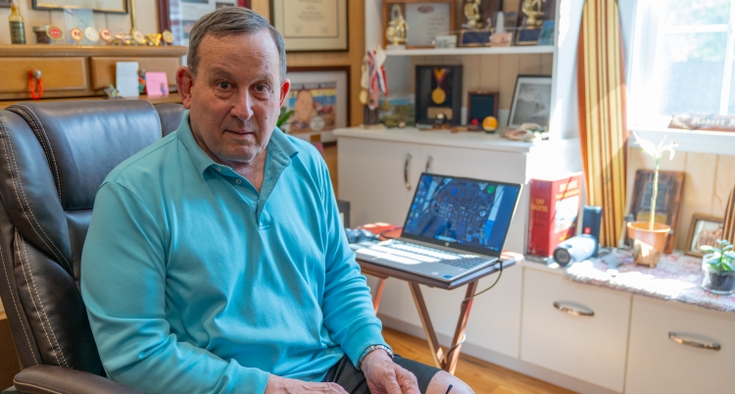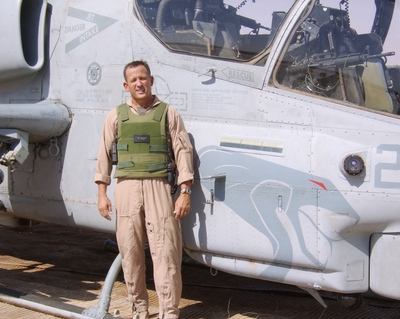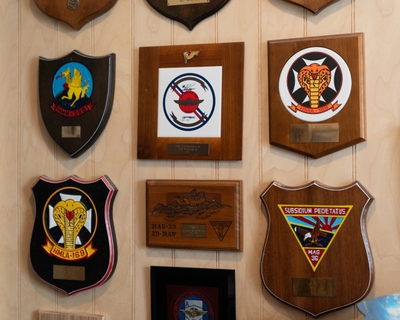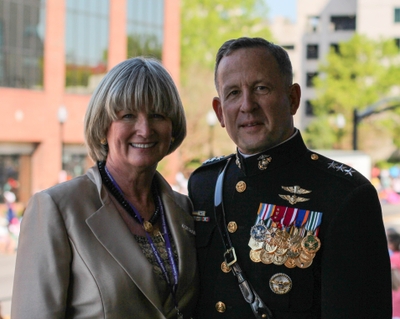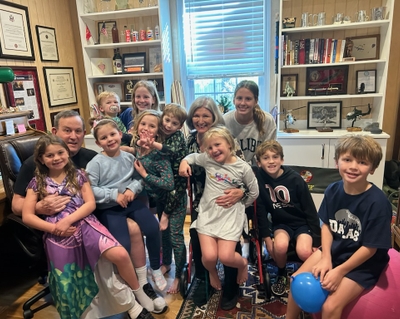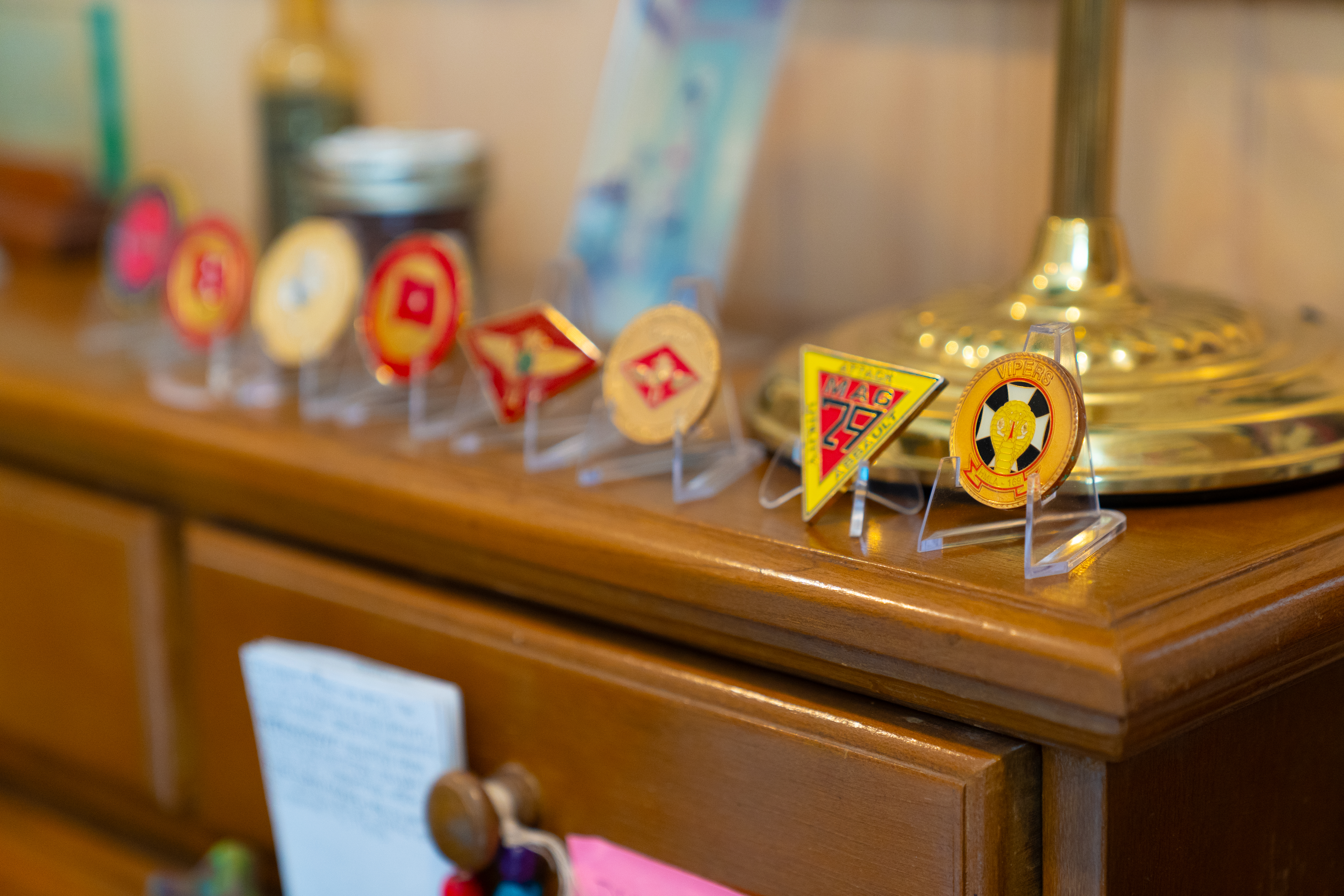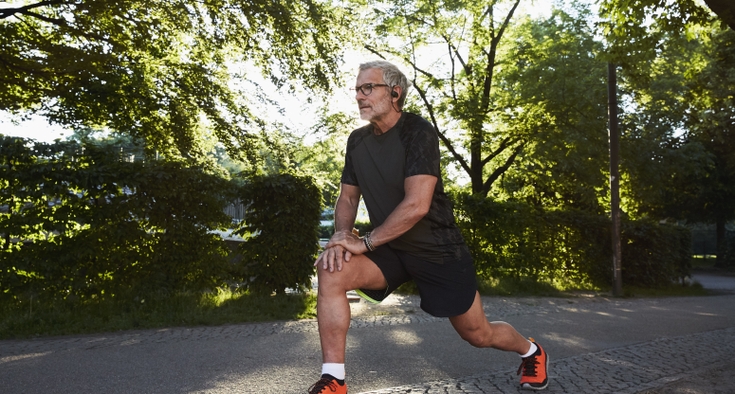Retired Lt. Gen. Robert Milstead knows how to live life at full throttle — and to persevere through pain. He honed those skills over 40 years as a U.S. Marine, piloting Cobra helicopters, parachuting, and leading Marines into combat in Iraq.
But Milstead, 73, faced a different kind of battle earlier this year when he needed knee replacement surgery at Novant Health New Hanover Orthopedic Hospital in Wilmington — and his recovery was complicated by a rare genetic condition. He credits the team at Novant Health New Hanover Rehabilitation Hospital for getting him through the ordeal and back on his feet.
His inpatient rehabilitation was overseen by Dr. Bryan Chadwick, a physiatrist. “Most folks with knee replacement are safe to go home right away. General Milstead was a unique case,” Chadwick said.
Not only is inpatient rehab intense — patients work at it three times a day — at Novant Health, it’s also highly personalized to each patient, Chadwick said. For Milstead, that personalization meant one thing: more.
“He wanted as much as anybody would give him,” Chadwick said. “When the patient pushes you, you can push the patient. And that leads to an even better outcome, and I think that contributed to why he did so well here.”
As for Milstead, he’s got nothing but praise for his experience.
“Novant Health, they’ve upped the game,” Milstead said. “I’m a fan.”
Find the orthopedic care you deserve
‘Comfortable with being uncomfortable’
As a young guy searching for a profession, Milstead trained his sights on the sky. His father was a career Air Force officer, so Milstead assumed the Air Force was his next step — until the day he passed a U.S. Marines recruiting office and saw a poster depicting a Marine in a flight helmet. He walked through the door — and into a career that would take him as far as Japan, Turkey and Iraq.
Milstead was commissioned as a second lieutenant in 1975. Aviator school followed, and soon Milstead was winging through the skies as a Cobra pilot — and jumping into those skies with a parachute on his back.
“It’s an active life,” Milstead said. The work, along with Milstead’s lifelong passion for surfing, took a toll on his body, but he brushed that aside. “I’m a Marine,” he said. “We’re taught to be comfortable with being uncomfortable.”
In 2001, Milstead assumed command of Marine Aircraft Group 29 at New River, North Carolina, and his MAG-29 War Eagles deployed in combat during Operation Iraqi Freedom. The assignments and the challenges kept coming, including 13 months in Iraq as a wing commander in 2005 and 2006.
“I had a lot of people, and they were spread over the Syrian border, all the way right up against Baghdad,” Milstead said. “All the Marine aviation in Iraq in 2005 was with us and it was very kinetic.” (That’s military language for “violent.”)
Milstead, who with his wife, Suzanne, has three adult daughters and a son, continued to grow his military career. He led in other areas such as public affairs and recruiting, and his career culminated in the role of deputy commandant, manpower and reserve affairs — “HR on steroids,” as he put it — and the rank of lieutenant general. He retired in 2014.
“I’ve had some great assignments,” Milstead said. But not long ago, he was handed perhaps the most difficult assignment of all.
'Nothing happens by mistake’
“About five and a half years ago, I went to bed as normal,” Milstead said. “When I woke up, my whole right side was numb. I’m like ‘OK, that’s a stroke.’” At the ER, tests showed no stroke, tumor or brain bleed. Milstead’s condition deteriorated rapidly, and soon he couldn’t walk.
Fast forward through more than a month of rehab at the same place he’d later go for his knee, along with testing for everything from multiple sclerosis to Lyme disease, from ALS to mad cow disease, and Milstead finally wound up at the National Institutes of Health. “They took a bunch of blood,” he said, “and determined I have HSP.”
HSP — hereditary spastic paraplegia — is caused by a genetic mutation. It causes motor neurons to degenerate so that muscles don’t get the right messages from the brain, making movement and walking progressively difficult. Fewer than 50,000 people in the U.S. have the condition — just .01% of the population. The incurable condition had been lurking inside Milstead all his life but never affected him until his late 60s. He swallowed the news — and moved on.
“Resiliency is a byproduct of Marines,” he said. “It is what it is — nothing more, nothing less. You play the hand dealt you. I’m a man of faith and feel nothing happens by mistake — there’s a reason I’m dealing with this. I get comfort from believing that.”
So Milstead hung up his surfboards, learned how to move with a walker and got used to his new normal. Unfortunately, the weakness of his right side forced him to depend heavily on his left. And his left knee began screaming in protest.
“It was bone on bone,” Milstead said. “I’d be pushing my walker, and my left knee would buckle and I would go down. You don’t even have time to get out ‘Mayday! Mayday!’”
Dr. Shawn Hocker replaced the knee at Novant Health New Hanover Orthopedic Hospital. Normally, joint replacement patients go home and get physical therapy as an outpatient. But because of Milstead’s underlying genetic condition, the next stop was inpatient rehab at Novant Health New Hanover Rehabilitation Hospital.
Time for tough love
Here’s what rehab is: A way to restore movement and function after illness, injury or surgery with exercises that are often painful and challenging. Here’s what rehab isn’t: Lying in a hospital bed, convalescing. “It was three hours of occupational therapy and physical therapy a day,” Milstead said. “That’s tough love.”
And that’s exactly what he wanted. “One time I’m like ‘Hey, my wheelchair is across the room, will you get it?’ and (the therapist) said ‘You want your wheelchair, you walk over there and get it.’ It was great there!”
Sarah Arnott was Milstead’s physical therapist. “In that rehab gym we have everything. Regular beds to practice getting in and out. A ‘beach’ to practice walking on sand. A car — I think it’s a Buick sedan — to be able to do a car transfer,” Arnott said. Milstead, she said, “took everything in stride.”
Because of his genetic condition, movements unrelated to his knee replacement also needed help, so he worked on those with his occupational therapist, Meredith Malisher.
“The physical therapist and I work as a team together but I’m going to focus more on activities of daily living,” Malisher said. “That could be self-care or cooking, cleaning, yard work, feeding pets.” Milstead, she said “was an awesome patient.”
“He was very motivated,” she said. “All my (military) service people I get are very motivated.”
The goal of rehab is to help people become as independent as possible. Having a care team with each person under the Novant Health umbrella “standardizes the care you’re getting,” Arnott said. “Everyone is on the same page, with the goal of early mobility.”
Milstead was all in, and he warned his therapists: “Marines are not patient patients. You tell them you need to three reps of 10 three times a day — Marines will do four reps of 15, four times a day.”
The team rose to the challenge, and Milstead tackled his rehab the same way he’d tackled every goal in his career. He got stronger and more stable, reclaiming his ability to move. After he was discharged, he praised the care in a note of gratitude. “Dr. Chadwick and his entire staff are first-rate; the nurses, therapists, and support staff are a jewel in the crown,” he wrote. “You can be proud of your rehab unit!”
Rehabilitation after surgery is “the ultimate team sport,” Chadwick said.
“In our setting, we take care of people most of whom have just been through something relatively traumatic,” he said. “Therapists are hands-on, but I would not discount the overall experience that patients have here and that is created by the really phenomenal team we have and everybody ‘s dedication to the patient’s best outcome. We work to everyone’s needs. And that sets us apart.”
As for Milstead, he’s got plans: continuing service on several boards, reading and playing with his 10 — soon to be 11 — grandchildren. And he continues to talk up inpatient rehabilitation at Novant Health.
“I owe these guys and gals. Not once but twice I’ve been in that rehab unit,” he said, “and they’re a bunch of pros in there.”
Knee replacement advice from a general
Considering joint replacement surgery? Here are retired Lt. Gen. Robert Milstead’s tips for success
Remember that surgery is just the first step. “The key is what you do afterward,” Milstead said. “I’ve learned you do what (the physical therapists) say. They know what they’re talking about. That’s a hard lesson sometimes.”
You can ask for more. “A lot of people say, ‘it hurts’ and so are reluctant to do the exercises,” Milstead said, but you’ll get out of it what you put in. Consider asking your therapist for more exercises, rather than doing the bare minimum. “It’s not fun,” Milstead said, “but it’s necessary if you want to get back."





